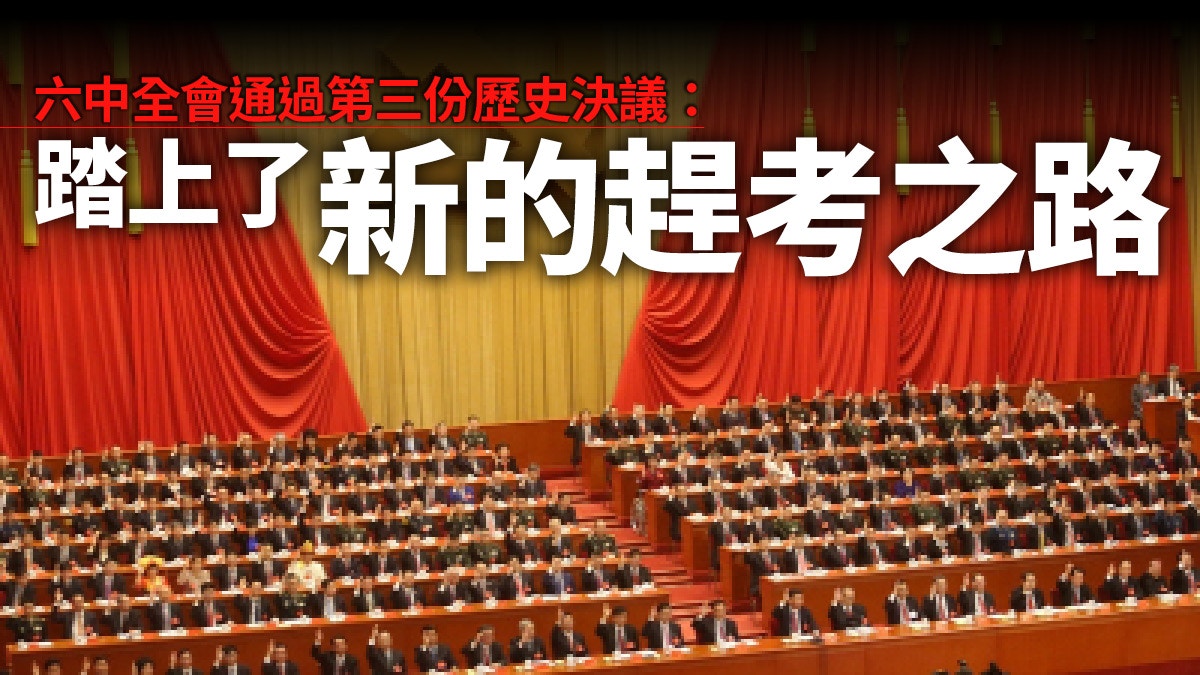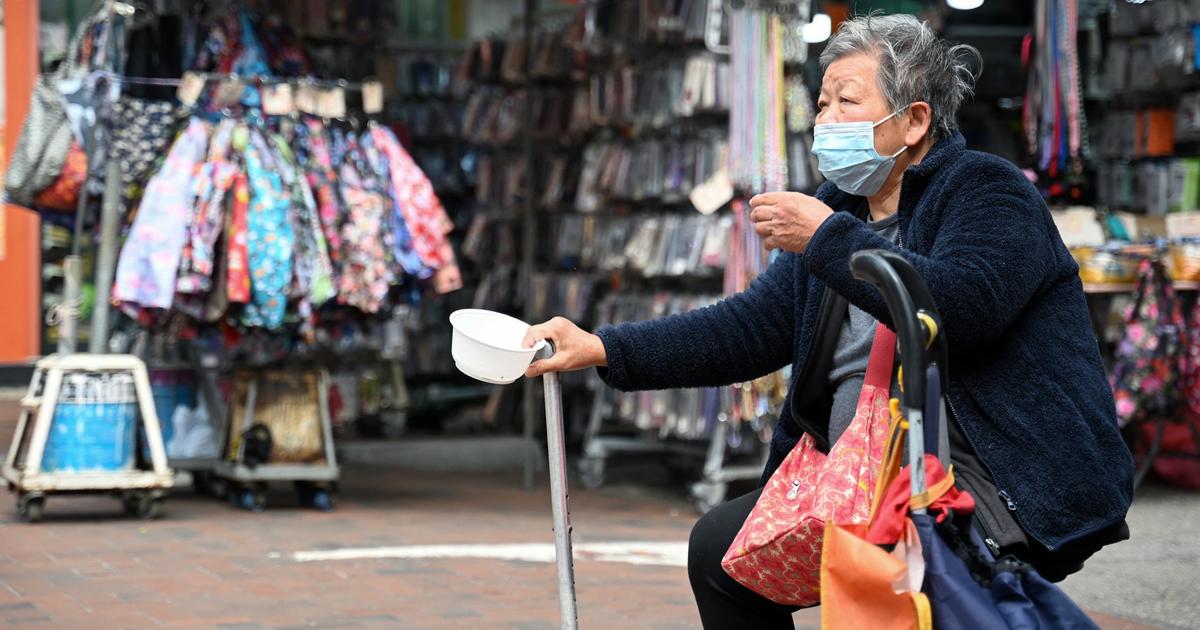The Sixth Plenary Session of the 19th Central Committee of the Communist Party of China (hereinafter referred to as the "Sixth Plenary Session") closed last Thursday (11th).
This meeting is not just the last important plenary meeting of the CPC General Secretary Xi Jinping during his second term. This year is the 100th anniversary of the founding of the CPC.
This historic meeting passed the "Resolution of the Central Committee of the Communist Party of China on Major Achievements and Historical Experience of the Party's Centennial Struggle", summarizing the history of the Chinese Communist Party from 1921 to 2021.
This is the third historical resolution in the history of the Communist Party of China.
In addition to the official qualifications and summaries of some historical issues, the past two copies have also established the direction of future development for the CCP, which is facing tremendous changes.
In 1945, when the Seventh Plenary Session of the Sixth Central Committee of the Communist Party of China issued the "Resolution on Certain Historical Issues," the CCP was facing a situation where a full-scale civil war would erupt between the Kuomintang and the Communist Party after the end of Japan’s invasion of China. In addition to defining the right and left errors of the early founding of the CCP, The resolution also established the CCP system led by Mao Zedong.
In 1981, the Sixth Plenary Session of the Eleventh Central Committee of the Communist Party of China issued the "Resolution on Certain Historical Issues of the Party Since the Founding of the People's Republic", which reflected profoundly on historical issues such as Mao Zedong and the Cultural Revolution, and at the same time had just experienced a series of political movements such as the Cultural Revolution. The Communist Party of China has redefined the reform and opening-up development route centered on Deng Xiaoping.
The newly adopted third historical resolution centered on the centuries-old struggle history of the Chinese Communist Party and reaffirmed the contributions of Mao Zedong, Deng Xiaoping and other leaders of the Chinese Communist Party. It solved the problem of absolute poverty, and successfully ran towards a well-off society in an all-round way, completing the first century-old goal.
At present, the CCP is faced with "great changes unseen in a century." The resolution believes that it must be based on the successful experience of a century of struggle and re-establish the path of Xi Jinping’s new era of socialism with Chinese characteristics as the main body. The leadership of the party insists on insisting on the people's supremacy, insisting on theoretical innovation, insisting on independence, insisting on the Chinese road, insisting on keeping the world in mind, insisting on pioneering and innovating, insisting on daring to struggle, insisting on the united front, insisting on self-revolution, and facing the challenges of the next century.
The place where the Chinese Communist Party has succeeded in the past century is undoubtedly the reason that the ruling officials realize that the people are the examiners. The people in power must be anxious when facing the people and should not be negligent.
(Reuters)
Learn from history
These three historical resolutions all have extremely important significance.
However, many people in Hong Kong and Western countries treat them as "the second king, and they have no idea."
Superficial thinking may think that this is just the CCP’s touting its own "great achievements"; even if it is a little serious study, it is often difficult to understand why the CCP spends so much energy on historical issues. For modern politics, research A century of history does not seem to have any special significance.
This gap actually explains the difference between the CCP and the West in understanding the relationship between history and current politics.
As the saying goes, "History is a mirror to know the rise and fall." For the CCP, history is a question worthy of deep reflection.
Through self-reflection through these hundred years of experience, the CCP can summarize the reasons for its past successes and failures.
The first two historical resolutions of the Chinese Communist Party focused on reflecting on past failures, and then thinking about the future path from them.
Since the reform and opening up, the CCP has slowly found a unique development path from crossing the river by feeling the stones. In fact, it was the result of the second historical resolution reflecting on the Mao Zedong era and the Cultural Revolution.
The current third historical resolution provides a great review of the party's history over the past 100 years, summarizing that the CCP has resolutely followed its own path and successfully contributed to China's development today, and objectively evaluates historical experience.
It is both self-affirmation and self-criticism; it is both absorbing experience and self-reflection.
In Western politics, reviewing history is not as important as the CCP.
For Western democratic systems, success or failure represents nothing but being elected or lost.
Therefore, for political parties and politicians under the Western democratic system, instead of spending time thinking about the historical gains and losses and significance of decades or even a century, it is better to spend more time on how to win more votes in the next election to maintain victory or fight for the "losers." resurrection".
What's more, many Western parties are just by-products of populist thoughts, and they lack historical experience to reflect on.
In this kind of political environment, the political eye can only be placed on elections, and the reflection is only how to cater to the populist to get more votes. Naturally, it is difficult to have a big blueprint for the overall situation and great ambitions for the future.
From this point of view, it is not without reason that the CCP can continue for a hundred years. Although the CCP is a political party, its connotation is far different from Western parties.
Politics is the same as doing things, and there is no possibility of knowing everything in advance. Therefore, for politicians, "making mistakes" on new issues is not the biggest political mistake. What is more important is whether they can have enough wisdom to overcome their failures. Criticize, learn lessons from historical experience, and explore ways to solve problems through reforms.
Many politicians in Hong Kong lack the wisdom and courage to reflect on history.
Some governing officials just hold the mentality of a civil servant, and they want to make things easier for their politics, let alone reform, and even lack the awareness of seriously reflecting on history.
Politicians occasionally emphasize history, but they often regard it as a political tool, and few people earnestly learn from it.
As far as June 4th is concerned, pan-democratic politicians often talk about it, but they only stay at the rigid understanding of the "CCP tyranny", and they even fixed their perception of the CCP and even China for more than 30 years. forward.
It can be said that they have not really reflected on the history of how the road should go in the future.
When facing the people, Hong Kong officials sometimes even have a superior posture, and they are not anxious about politics.
With such a posture of being superior, you can only be called "government lord". How can "democracy" come about?
(Photo by Zheng Zifeng)
Governing the country if the exam is the governance is like rushing the exam
Hong Kong has returned to China for more than 24 years and has experienced large-scale social turmoil such as the "Occupy Central" and the anti-revision law turmoil. For the governing officials and politicians, the results of these events are failures.
But after all, this is the end of the matter. What is more important is whether politicians can re-find a path suitable for Hong Kong to go on by reflecting on these failures.
Throughout its century of history, the CCP has always used the metaphor of "quick exams" in its governance.
In March 1949, before the CCP was preparing to enter Beijing (known as "Beiping" in the fashion), Mao Zedong described the trip to Zhou Enlai in Xibaipo as "quick test", hoping to get a good result in the test.
The communiqué of the Sixth Plenary Session of the 19th Central Committee of the Communist Party of China concluded that "the party has handed over an excellent answer to the people and history in the past 100 years," and now it is embarking on a "new road to rushing the exam."
The so-called examination refers to the test of whether a political party can successfully govern the country.
As the CCP has repeatedly mentioned on many occasions in recent years, only the people of a country are qualified to comment on whether that country is democratic, so the examiners who are qualified to score a government’s governance are naturally only the people of that country.
The place where the Chinese Communist Party has succeeded in the past century is undoubtedly the reason that the ruling officials realize that the people are the examiners, and that the politicians must be as anxious as the people rushing to the examinations, and should not be negligent in the least, for fear of failing.
This is also the meaning of "democracy" as understood by the CCP-the people are the masters of the country.
However, Hong Kong officials do not have a deep understanding of this. Sometimes they even have a superior posture in the face of the people. They are not anxious for the government and they just follow their own pace.
With such an attitude of being superior to the government, it can only be called "government master". How can "democracy" come about?
Please pay attention to the 291st "Hong Kong 01" weekly electronic report published on November 15, 2021. You can also
click here to
sample the weekly e-newsletter and read more in-depth reports.










/cloudfront-eu-central-1.images.arcpublishing.com/prisa/KMEYMJKESBAZBE4MRBAM4TGHIQ.jpg)

